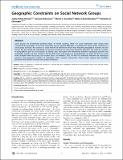Geographic Constraints on Social Network Groups
Author(s)
Onnela, Jukka-Pekka; Arbesman, Samuel; Gonzalez, Marta C.; Barabasi, Albert-Laszlo; Christakis, Nicholas A.
DownloadOnnela-2011-Geographic Constrain.pdf (779.0Kb)
PUBLISHER_CC
Publisher with Creative Commons License
Creative Commons Attribution
Terms of use
Metadata
Show full item recordAbstract
Social groups are fundamental building blocks of human societies. While our social interactions have always been constrained by geography, it has been impossible, due to practical difficulties, to evaluate the nature of this restriction on social group structure. We construct a social network of individuals whose most frequent geographical locations are also known. We also classify the individuals into groups according to a community detection algorithm. We study the variation of geographical span for social groups of varying sizes, and explore the relationship between topological positions and geographic positions of their members. We find that small social groups are geographically very tight, but become much more clumped when the group size exceeds about 30 members. Also, we find no correlation between the topological positions and geographic positions of individuals within network communities. These results suggest that spreading processes face distinct structural and spatial constraints.
Date issued
2011-04Department
Massachusetts Institute of Technology. Department of Civil and Environmental EngineeringJournal
PLoS ONE
Publisher
Public Library of Science
Citation
Onnela J-P, Arbesman S., Gonzalez M.C., Barabasi A-L, Christakis N.A. (2011) "Geographic Constraints on Social Network Groups." PLoS ONE 6(4): e16939.
Version: Final published version
ISSN
1932-6203